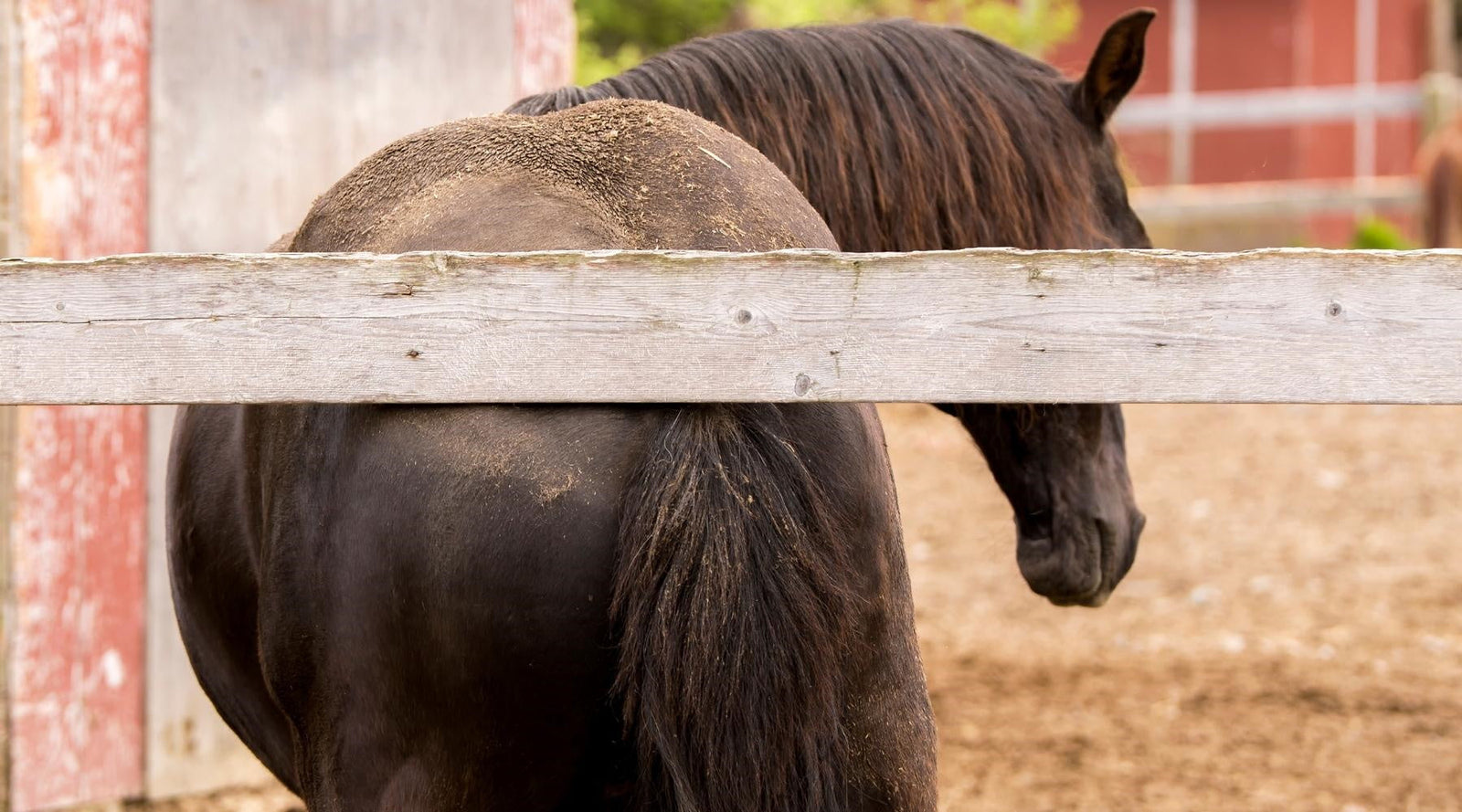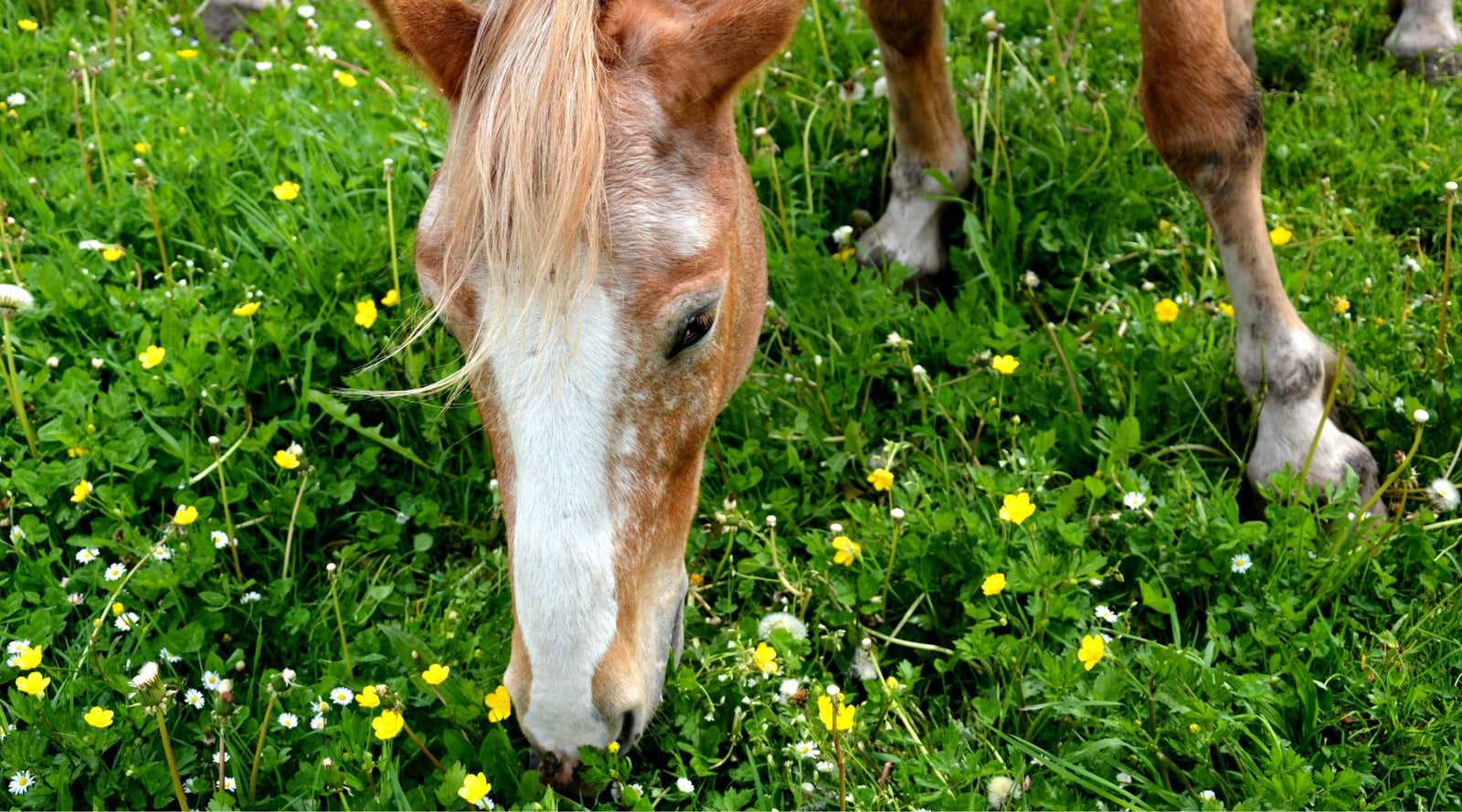Triple Hippo Rewards points are now available on all purchases made before midnight 24th February 2026.
Triple Hippo Rewards points are now available on all purchases made before midnight 24th February 2026.
Horse & Rider
Itchy horse? Tips For Identifying And Managing Skin Conditions
by Fiona Lane December 10, 2025

If your horse is rubbing, biting or scratching more than usual, you’re not alone — skin irritation is one of the most common issues horse owners face. From seasonal allergies and insect bites to sweet itch, feather mites, lice, and even behavioural causes, there are many reasons a horse might develop itchy or scurfy skin. Knowing how to spot the signs early and match them with the right management strategy makes all the difference.
There are so many reasons for skin conditions that it can often be hard to tell what the issue is, which can also make it tricky to know that you are using the right treatment. As always, if your horse’s condition is serious or persistent, we would recommend talking to your vet.
Key Highlights
- Common causes of itchy skin in horses: Seasonal grass allergies, insect bites, feather mites, sweet itch caused by bites from the Culicoides midge, ticks, lice, pinworms, and bacterial skin conditions like Rain Scald and Mud Fever.
- Grass allergies in horses often cause welts, general itchiness, or hayfever-like symptoms
- Mosquitos, ticks and flies can cause localised itching, stamping, or rubbing.
- Feather mites thrive in feathered areas, causing stamping, biting, and rubbing that can break the skin and lead to scarring.
- Sweet itch, sometimes called Queensland or Summer Itch, is caused by an allergic reaction to the saliva of the Culicoides midge.
- The Culicoides midge isn’t present in New Zealand; however, horses can present with similar symptoms as a result of bites from other types of midges.
- When to call the vet: Persistent, severe, or unexplained skin reactions should always be checked by a veterinarian.
From seasonal allergies to skin infections, identifying the cause of the itch is the first step to relief. In this blog post, we’ll take a closer look at the most common itchy skin conditions in horses, how to tell them apart, and the natural, competition-safe remedies that can help keep your horse’s skin calm and healthy year-round.
As always, if your horses’ condition is serious or persistent, we would recommend talking to your vet.
A word about itchy rumps
We often get asked about remedies for horses that constantly rub their rumps against anything they can find! If your horse is up-to-date with worming and you have checked that their sheath/udder does not need cleaning, then it’s likely this is related to behaviour more than an ailment that needs a remedy. Mares often gently bite newborn foals on the base of their tails to stimulate bowel movements, so rubbing this area is often done for comfort, or just out of boredom! If you are concerned the behaviour is due to stress, then you could try our Chilled Out Horse, or Separation Anxiety - Equine for more severe OCD related issues.
Grass allergies
If you’re getting ready for a big show and Bam! Your horse suddenly breaks out in welts; there’s a good chance it’s down to a grass allergy. Welts are one presentation of this seasonal allergy, but it can also present as general itchiness that isn’t confined to a particular area, hay fever-like symptoms, lethargy or irritability. As this allergy needs to be treated during show season, it’s important to use a remedy that is competition safe and that doesn’t have any side effects that might affect performance. Sounds like our Grass Allergy Equine – a 100% natural remedy that supports a normal immune response to these allergens.
Insects, Mites & Midges
The trick is figuring out which bug is doing the biting! A reaction to a bug bite is often short-lived lived lasting around 10 days or so; however, the allergic reaction won’t stop until the bugs do, and in the meantime, our much-loved horses can rub their skin raw, inviting in a bacterial infection. Getting these allergies sorted early and continuing to treat throughout the season is important.
Sometimes, where the itching occurs can indicate which biting bug you need to deal with.
Mozzies, ticks or flies
If it’s these bugs that are doing the biting, then bites and itchiness won’t be confined to just one area. We recommend our innovative Ticks Plus remedy – it’s dosed orally via the water trough and works to subtly change the body odour of the horse so these biting bugs no longer see it as their next meal. Genius! And probably why it’s one of our best sellers.
Feather Mites
These mites tend to take up home in the feathered areas, making some breeds, such as Clydesdales, more susceptible. Infested horses tend to stamp and bite at their legs or rub their legs against things that can result in broken skin, and in severe cases, this can cause scarring that affects movement of the pastern joints. Our Feather Mites Plus remedy has a repellent effect on these mites that takes 7-10 days to take effect and can then be managed with a dose in the water trough every second day.
Sweet Itch
Also known as Queensland Itch or Summer Itch, Sweet Itch is caused by an allergic reaction to the saliva of the Australian-based Culicoides midge. These little beasties are usually found in the mane or tail, so if you live in Australia and your horse is itchy in one of these places or is constantly rubbing its rump or whatever it can find, these midges could be the cause. It's worth treating before the skin is rubbed raw, inviting more severe infection.
Our Sweet Itch Plus remedy is dosed via the water trough to give a boost to the immune system every time the horse takes a drink. Our customers tell us they usually see a change in the horses’ condition within the first week.
While the Culicoides midge isn’t found in New Zealand, many horses still develop very itchy manes, tails and rumps due to bites from mozzies or other midges. Our Sweet Itch NZ remedy has been professionally formulated to support horses in New Zealand with sweet itch-like symptoms.
Pin Worms
These will often cause your horse to constantly itch and rub its rump. If you think your horse has worms, we recommend talking to your vet for treatment.
Lice
A common reason for itching in horses, especially those that have thick winter coats or who live in close contact with other animals. Signs your horse may have lice include excessive itching, rubbing, patchy hair loss, a dull coat, or visible tiny insects or eggs (nits) around the mane, tail base, or under the forelock. Our Lice Plus – Equine remedy is a natural, competition and racing safe (not swab-able) option for managing infestations.
Warts
These unsightly blemishes aren’t harmful and will often clear up on their own as the immune system develops, particularly in younger horses. Sometimes warts grow in unhelpful areas, such as on an eyelid. In this case, we recommend dosing with our Warts Plus remedy.
Oedema & Swelling
Changes to grasses across the seasons can affect blood protein levels in some horses, resulting in swelling in places where fluid might pool due to the effects of gravity – a swollen sheath or under belly are the most common presentations. Puffiness Plus is formulated to support a natural immune response to this kind of swelling.
Rain Scald & Mud Fever / Scratches
These conditions are caused by bacteria called Dermatophilus congolensis and present as scabby crusts or clumps of matted hair. It’s called Rain Scald if caused by chronic dampness due to water run off down the barrel, shoulders and hind quarters, or Mud Fever (Scratches if you live in the USA) if it presents on the lower legs of horses that stand in mud or snow, or graze in long wet grass.
These conditions become a real problem when the crusts peel off, leaving spots of bare or broken skin that are prone to infection. Treatment can be painful and traumatising for both animal and owner, which is why we developed our groundbreaking Mud & Rain remedy. This remedy is given orally, so there’s no need to touch or scrape affected areas or apply bandages and creams. It’s one of our most popular remedies – take a look at the reviews!
Can an oral remedy help?
One thing our customers love about our remedies is that they’re dosed orally, and often by simply adding the remedy to a water trough. We often get asked how oral dosing can be effective. If you’re also wondering, then take a look at these oral dosing FAQs.
Knowing exactly what you are treating is key to getting a good result, so if you are unsure or already dealing with a severe reaction, we recommend talking to your vet.
Final thoughts
Skin irritation and itching are common challenges for horse owners, especially through the warmer months when insects, allergens and seasonal changes are at their peak. The key is identifying the underlying cause and taking early steps to manage it before it leads to infection or discomfort.
Our range of 100% natural, competition-safe remedies makes it easy to support your horse’s skin health without stress or harsh chemicals. From Grass Allergy - Equine and Feather Mites Plus to Sweet Itch Plus, Lice Plus, and Mud & Rain, there’s a gentle, effective option to help every horse stay comfortable and healthy all season long.

Homeopathic Practitioner | BA, Dip Ed, Dip Hom AH (Animal Health)
Fiona J. Lane
Fiona Lane is the Founder of Hippo Health and an accomplished Animal Homeopath. Driven by a passion for effective and affordable natural health, she has formulated the Hippo Health and BioPet ranges of innovative, non-toxic remedies. Fiona is dedicated to providing straightforward, trusted solutions that support the well-being of horses, pets, livestock and people.
General Disclaimer: Always follow dosing instructions. Our remedies are formulated to support the natural immune system of horses, pets, livestock, and people. We do not claim to treat, medicate, or cure any health conditions. If you are worried an animal may be in pain or suffering, please contact your veterinarian.




